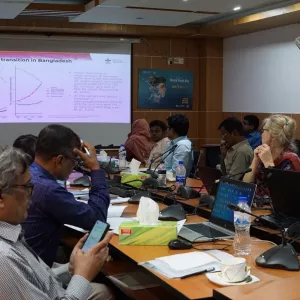Researchers discuss food system trade-off analysis with stakeholders in Bangladesh
On June 9, 2024, researchers from the CGIAR Research Initiative on Sustainable Healthy Diets through Food Systems Transformation (SHiFT) met with Strategic Partners from the Food Planning and Monitoring Unit (FPMU) of the Ministry of Food and the Bangladesh National Nutrition Council (BNNC) to share research findings from two recent studies completed as part of SHiFT’s Using foresight modeling techniques,

Researchers discuss food system trade-off analysis with stakeholders in Bangladesh
On June 9, 2024, researchers from the CGIAR Research Initiative on Sustainable Healthy Diets through Food Systems Transformation (SHiFT) met with Strategic Partners from the Food Planning and Monitoring Unit (FPMU) of the Ministry of Food and the Bangladesh National Nutrition Council (BNNC) to share research findings from two recent studies completed as part of SHiFT’s
Using foresight modeling techniques, the first study examined how food demand in Bangladesh has changed over time and estimated how consumer demand might shift as the economy continues to grow. Consistent with other literature on the changing Bangladeshi diet, the study found that diets have diversified away from the substantially rice-based diet consumed in the 1980s and 1990s. Although diversity of are improving, there has also been a substantial increase in demand for sugar and processed foods, which is associated with the rise in overweight and obesity prevalence. The study also showed that dietary change varies between different population groups: diets have changed the most among richer, urban households, while only marginal changes in diets were observed among poor rural households.
The second study used economic models to identify the potential trade-offs and synergies of adopting different dietary patterns over different periods of time, the next 20 years (2022-2040) and the next 30 years (2022-2050). The study examined three dietary scenarios: a business-as-usual diet, a diet consistent with Bangladesh’s food-based dietary guidelines (FBDGs), and the planetary health diet proposed by the EAT-Lancet Commission (EAT-Lancet diet). The researchers measured how greater adoption of those diets would correlate with four socioeconomic indicators, a health indicator, and five environmental indicators. The analysis revealed that if Bangladesh’s population were to adopt the national FBDGs, it would be associated with positive changes in diet quality and an overall positive impact on the environment, as compared to the business-as-usual diet scenario. The results were comparable to adopting the EAT-Lancet .
SHiFT researchers from Wageningen University and Research reported engaging in productive discussions with national stakeholders about the main findings of both studies. Based on feedback from FPMU staff, the SHiFT team will engage with experts from Bangladeshi universities to further validate and discuss the studies. Areas of particular interest to the group focused on how value chains for fruits and vegetables can be adjusted to reduce food loss and waste and how proper storage facilities could extend the period of fruit and vegetable availability after the harvest season. These changes could benefit both consumers and producers, potentially leading to higher vegetable and fruit consumption and better overall diet quality. The long-run trade-off analysis showed that agricultural diversification—in particular, an increase in fruits, vegetables, pulses, and nuts—is needed to ensure sufficient supply to support wider adoption of a diet based on the national FBDGs.
Prior to these meetings, SHiFT researchers presented findings from their long-run trade-off analysis as a showcase session titled “Quantitative Modeling within the Foresight Process” during the 4th Global Foresight4Food Workshop in Dhaka, Bangladesh. This global five-day workshop, which was attended by more than 100 delegates from 20-plus countries, focused on achieving the transformative potential of stakeholder engagement in food systems foresight.
The International Food Policy Research Institute and the Alliance of Bioversity and CIAT lead SHiFT in close collaboration with Wageningen University and Research and with contributions from the International Potato Center. SHiFT combines high-quality nutritional and social science research capacity with development partnerships to generate innovative, robust solutions that contribute to healthier, more sustainable dietary choices and consumption of sustainable healthy diets. It builds on CGIAR’s unparalleled track record of agricultural research for development, including ten years of work on food systems and nutrition under the CGIAR Research Program on Agriculture for Nutrition and Health (A4NH).
Header image: SHiFT researchers discuss findings from their food systems trade-off analysis with stakeholders from the Food Planning and Monitoring Unit (FPMU) at the FPMU office in Dhaka, Bangladesh. Photo by Md. Zubair Hossain.

